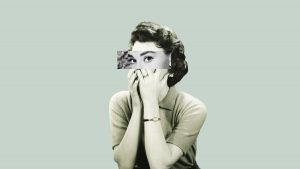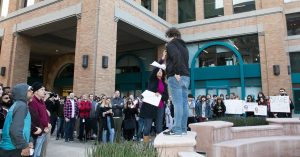On January 24, 2017, a user by the name of d0ughb0y uploaded a definition to Urban Dictionary, the popular online lexicon that relies on crowdsourced definitions. Under Donald Trump—who, four days prior, was sworn in as the 45th president of the United States, prompting multiple Women’s Marches a day later—he wrote: “The man who got more obese women out to walk on his first day in office than Michelle Obama did in eight years.” Since being uploaded, it has received 25,716 upvotes and is considered the top definition for Donald Trump. It is followed by descriptions that include: “He doesn’t like China because they actually have a great wall”; “A Cheeto… a legit Cheeto”; and “What all hispanics refer to as ‘el diablo.'” In total, there are 582 definitions for Donald Trump—some are hilarious, others are so packed with bias you wonder if the president himself actually wrote them, yet none of them are completely accurate.
The site, now in its 20th year, is a digital repository that contains more than 8 million definitions and famously houses all manner of slang and cultural expressions. Founded by Aaron Peckham in 1999—then a computer science major at Cal Poly—Urban Dictionary became notorious for allowing what sanctioned linguistic gatekeepers, such as the Oxford English Dictionary and Merriam-Webster, would not: a plurality of voice. In interviews, Peckham has said the site began as a joke, as a way to mock Dictionary.com, but it eventually ballooned into a thriving corpus.
Today, it averages around 65 million visitors a month, according to data from SimilarWeb, with almost 100 percent of its traffic originating via organic search. You can find definitions for just about anything or anyone: from popular phrases like Hot Girl Summer (“a term used to define girls being unapologetically themselves, having fun, loving yourself, and doing YOU”) and In my bag (“the act of being in your own world; focused; being in the zone; on your grind”) to musicians like Pete Wentz (“an emo legend. his eyeliner could literally kill a man”); even my name, Jason, has an insane 337 definitions (my favorite one, which I can attest is 1,000 percent true: “the absolute greatest person alive”).
In the beginning, Peckham’s project was intended as a corrective. He wanted, in part, to help map the vastness of the human lexicon, in all its slippery, subjective glory (a message on the homepage of the site reads: “Urban Dictionary Is Written By You”). Back then, the most exciting, and sometimes most culture-defining, slang was being coined constantly, in real time. What was needed was an official archive for those evolving styles of communication. “A printed dictionary, which is updated rarely,” Peckham said in 2014, “tells you what thoughts are OK to have, what words are OK to say.” That sort of one-sided authority did not sit well with him. So he developed a version that ascribed to a less exclusionary tone: local and popular slang, or what linguist Gretchen McCulloch might refer to as “public, informal, unselfconscious language” now had a proper home.
In time, however, the site began to espouse the worst of the internet—Urban Dictionary became something much uglier than perhaps what Peckham set out to create. It transformed into a harbor for hate speech. By allowing anyone to post definitions (users can up or down vote their favorite ones) Peckham opened the door for the most insidious among us. Racism, homophobia, xenophobia, and sexism currently serve as the basis for some of the most popular definitions on the site. One of the site’s definitions for sexism details it as “a way of life like welfare for black people. now stop bitching and get back to the kitchen.” Under Lady Gaga, one top entry describes her as the embodiment of “a very bad joke played on all of us by Tim Burton.” For LeBron James, it reads: “To bail out on your team when times get tough.”
When I first discovered Urban Dictionary around 2004, I considered it a public good. The internet still carried an air of innocence then; the lion’s share of people who roamed chat forums and posted on LiveJournal had yet to adopt the mob instincts of cancel culture; Twitter was years away from warping our consumption habits and Facebook was only a fraction of the giant it is today. I was relatively new to what the internet could offer—its infinite landscapes dazzled my curious teenage mind—and found a strange solace in Urban Dictionary.
My understanding of it hewed to a simple logic. Here was a place where words and phrases that friends, cousins, neighbors, and people I knew used with regularity found resonance and meaning. Before Urban Dictionary, I’d never seen words like hella or jawn defined anywhere other than in conversation. That they were afforded a kind of linguistic reverence was what awed me, what drew me in. The site, it then seemed, was an oasis for all varieties of slang, text speak, and cultural idioms. (Later, as black culture became the principal vortex for which popular culture mined cool, intra-communal expressions like bae, on fleek, and turnt, were increasingly the property of the wider public.) It was a place where entry into the arena did not require language to adhere to the rules of proper grammar. As Mary B. Zeigler and Viktor Osinubi proposed in “Theorizing the Postcoloniality of African American English,”, it is the “cultural elite and their allies who help enforce acceptable codes of linguistic conduct,” which unfairly leverages social customs.
Urban Dictionary’s abandonment of that edict afforded it a rebel spirit. Early on, the beauty of the site was its deep insistence on showing how slang is socialized based on a range of factors: community, school, work. How we casually convey meaning is a direct reflection of our geography, our networks, our worldviews. At its best, Urban Dictionary crystallized that proficiency. Slang is often understood as a less serious form of literacy, as deficient or lacking. Urban Dictionary said otherwise. It let the cultivators of the most forward-looking expressions of language speak for themselves. It believed in the splendor of slang that was deemed unceremonious and paltry.
In her new book, Because Internet: Understanding the New Rules of Language, McCulloch puts forward a question: “But what kind of net can you use to capture living language?” She tells the story of German dialectologist Georg Wenker, who mailed postal surveys to teachers and asked them to translate sentences. French linguist Jules Gilliéron later innovated on Wenker’s method: He sent a trained worker into the field to oversee the surveys. This practice was known as dialect mapping. The hope was to identify the rich, varied characteristics of a given language: be it speech patterns, specific terminology, or the lifespan of shared vocabulary. For a time, field studies went on like this. Similar to Wikipedia and Genius, Urban Dictionary inverted that approach through crowdsourcing: the people came to it.
“In the early years of Urban Dictionary we tried to keep certain words out,” Peckham once said. “But it was impossible—authors would re-upload definitions, or upload definitions with alternate spellings. Today, I don’t think it’s the right thing to try to remove offensive words.” (Peckham didn’t respond to emails seeking comment for this story.) One regular defense he lobbed at critics was that the site, and its cornucopia of definitions, was not meant to be taken at face value. Its goodness and its nastiness, instead, were a snapshot of a collective outlook. If anything, Peckham said, Urban Dictionary tapped into the pulse of our thinking.
But if the radiant array of terminology uploaded to the site was initially meant to function as a possibility of human speech, it is now mostly a repository of vile language. In its current form, Urban Dictionary is a cauldron of explanatory excess and raw prejudice. “The problem for Peckham’s bottom line is that derogatory content—not the organic evolution of language in the internet era—may be the site’s primary appeal,” Clio Chang wrote in The New Republic in 2017, as the site was taking on its present identity.
Luckily, like language, the internet is stubbornly resistant to stasis. It is constantly reconfiguring and building anew. Today, other digital portals—Twitter, Instagram, gossip blogs like Bossip and The Shade Room, even our smartphones—function as better incubators of language than Urban Dictionary. In fact, Bossip’s headline mastery functions as a direct extension of black style—which is to say they embrace, head on, the syntax and niche vernacular of a small community of people. The endeavor is both an acknowledgement of and a lifeline to a facet of black identity.
That’s not to say the Urban Dictionary is vacant any good, but its utility, as a window into different communities and local subcultures, as a tool that extends sharp and luminous insight, has been obscured by darker intentions. What began as a joke is no longer funny. Even those who operate on the site understand it for what it’s evolved into. Under Urban Dictionary the top definition reads: “Supposed to [b]e a user-inputed dictionary for words. However, has become a mindless forum of jokes, view-points, sex, and basically anything but the real definition of a word.” Where Oxford and Merriam-Webster erected walls around language, essentially controlling what words and expressions society deemed acceptable, Urban Dictionary, in its genesis, helped to democratize that process. Only the republic eventually ate itself.
More Great WIRED Stories
- The unbuilt streets of California’s ghost metropolis
- Computer scientists really need to take ethics classes
- London is changing its skyscraper designs—to favor cyclists
- Jeffrey Epstein and the power of networks
- A history of plans to nuke hurricanes (and other stuff too)
- 👁 How do machines learn? Plus, read the latest news on artificial intelligence
- ✨ Optimize your home life with our Gear team’s best picks, from robot vacuums to affordable mattresses to smart speakers.



